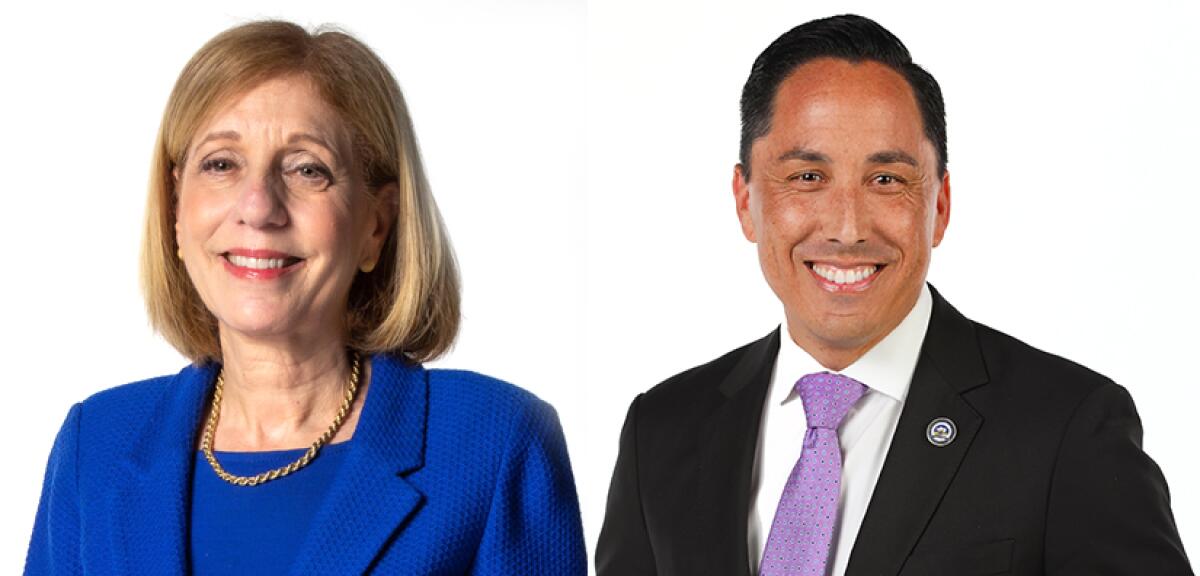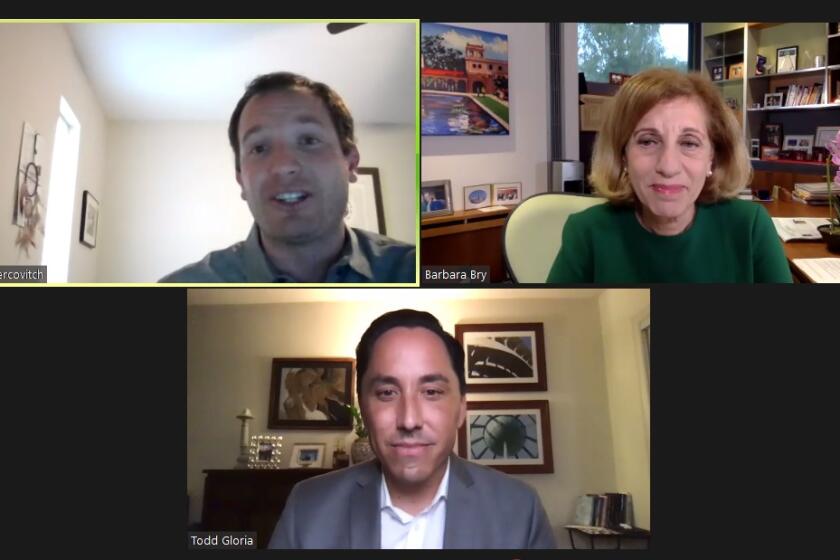Mayoral debate centers on homelessness and small-business issues

With six weeks left until the election in the San Diego mayoral race, the candidates — City Councilwoman Barbara Bry and state Assemblyman Todd Gloria — appealed to downtown business owners, landlords and residents in a teleconferenced debate about issues facing the Gaslamp area.
The Sept. 22 debate, presented by the the Gaslamp Quarter Association — a nonprofit merchants association that represents more than 400 businesses in the area — focused on issues most important to those living and working in downtown San Diego, including homelessness, infrastructure, the use of the San Diego Convention Center and restrictions placed on small businesses during the coronavirus pandemic.
Addressing everything from reducing homelessness to whether a hot dog is a sandwich, San Diego mayoral candidates Barbara Bry and Todd Gloria squared off in an online forum Sept. 9 presented by La Jolla’s Congregation Beth Israel.
The two candidates agreed on most issues. Both said they are against the current San Diego County public health order that requires restaurants to stop serving meals at 10 p.m., a restriction put in place to help prevent the spread of COVID-19.
Since most restaurants in the Gaslamp area depend on revenue generated between 10 p.m. and 2 a.m. and businesses have already implemented social-distancing protocols and other coronavirus safety measures, many business owners feel the restriction should be removed or at least extended beyond 10 p.m.
Gloria said he was on board with a “modest modification” to the county’s rule, given that restaurants have proved they can operate safely.
“I think this is the kind of modification that we should be considering,” Gloria said. “When we were advocating early in the pandemic ... there was a question about whether or not businesses would be willing or able to handle this successfully and safely, and I think the fact of the matter is that they’ve been able to do that.”
Bry said she agreed, since even an hour extension could help the downtown economy.
“It makes economic sense. You’re going to employ people,” Bry said. “You’re going to pay them. They’re going to pay taxes. You’re going to be generating more revenue [and] sales tax revenue for the city, and you’re already [operating] safely. Giving you an extra hour is only a win-win for all of us.”
Bry and Gloria were both in support of converting Fifth Avenue into a pedestrian-friendly promenade, a project many local business owners support, as it could help improve foot traffic in the area.
The two candidates also agreed that criminalizing homelessness is the wrong way to address the large homeless population in San Diego County — and more specifically in downtown San Diego.
They both said there needs to be a change in how homeless calls are addressed by law enforcement. There instead needs to be an increase in the number of trained mental health professionals who are better equipped at addressing the needs of homeless people, they said.
Bry’s and Gloria’s opinions clashed on Assembly Bill 5, which was signed in 2019 by Gov. Gavin Newsom and places limits on how businesses use independent contractors.
The law, which took effect in January, aimed to prevent workers from being wrongly classified as independent contractors, or “gig workers,” rather than employees, which supporters of the legislation said allowed employers to erode basic worker protections such as minimum wage, paid sick days and health insurance benefits.
Opponents and businesses hurt by the bill said it jeopardizes business and could force companies to shut down service in California or dramatically raise prices.
As a member of the state Assembly, Gloria voted for AB5 and said he still supports the legislation.
“Obviously in the pandemic, we have come to understand the extreme importance of unemployment insurance, of access to paid sick days,” Gloria said. “When workers are not provided that, that is benefits, that is money that flows into the pockets of the corporations that employ them, not to the benefit of the broader society.”
Bry has called for the repeal of AB5, calling it a “job killer” that has disproportionately hurt small businesses and was an antiquated approach that allows too many exemptions for industries to bypass the law’s requirements.
Bry said there’s a better approach offered in Proposition 22, which will be on the November ballot and guarantees benefits on a sliding scale, depending on how many hours employees work. It also guarantees “gig workers” more than the minimum wage, health care subsidies, also on a sliding scale, and occupational accident and injury insurance.
Gloria said he does not support Prop. 22.
Bry is a La Jolla resident who currently serves as president pro tem of the San Diego City Council, representing District 1, a seat she has held since 2016. On the council, she serves as chairwoman of the Budget and Government Efficiency Committee and vice chairwoman of the Rules Committee and the Committee on Public Safety and Livable Neighborhoods.
Bry said she could have sought re-election in District 1 but opted instead to run for mayor to try to cut the bureaucratic red tape she has encountered while serving on the council and to bring more accountability to the office.
“I probably could have had a second term on the City Council very easily, but I decided that I wanted to step up and use my executive experience to make significant change,” Bry said. “[I want] to truly develop a culture that is accountable and transparent and responsive to the needs of our businesses and our residents.”
Gloria served on the San Diego City Council from 2008 to 2016, when he was elected to represent the 78th District in the California Assembly. He was named council president in 2012 and served as interim mayor in 2013 following the resignation of then-Mayor Bob Filner, who faced sexual harassment allegations.
Gloria said he wants to lead San Diego to address problems that have plagued the city for years, such as infrastructure, affordable housing and increasing numbers of homeless people.
“It is time for us to quit acting like a small town and instead start acting like the eighth-largest city in the country that we are,” he said. “If we do that, we can dispense with the issues that have been on the table for so long but never seem to get addressed.”
Both Bry and Gloria are Democrats, though the mayor’s position is officially nonpartisan.

